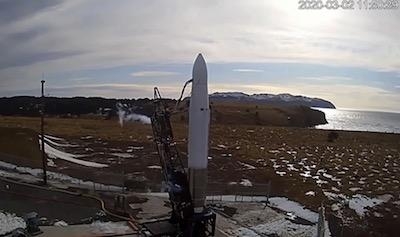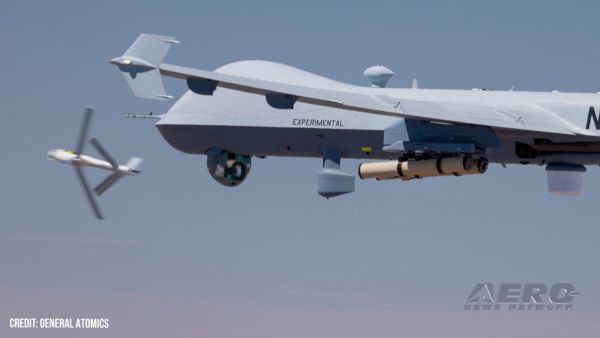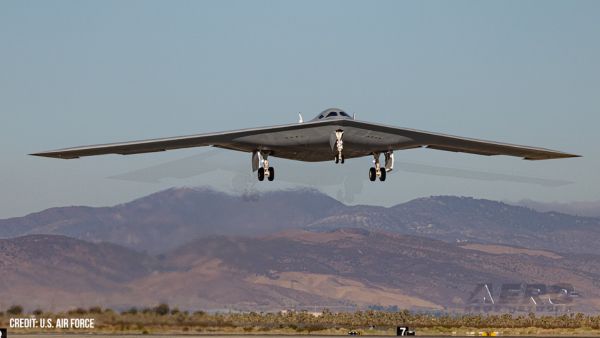Final Participant In Original Field Of Three Qualifiers Fails To Launch Following Successful Countdown Procedure
Less than two years from its start, DARPA’s effort to stress the approaches and processes associated with space launch ended March 2 with the lone Launch Challenge participant – Astra – scrubbing its launch with less than a minute left in the countdown before liftoff. Astra faced technical and weather-related issues during the roughly two-week window of the Challenge campaign, which ran February 17-March 2 in Kodiak, Alaska.

Meeting DARPA’s timeline to demonstrate a flexible, responsive launch capability proved especially difficult. Despite time, weather, and location limitations, Astra produced a rocket and set up launch operations at Pacific Spaceport Complex - Alaska (PSC-A) after having received final target orbit information only 30 days before launch and payload upon arrival.
“In roughly two weeks, Astra moved their entire rocket and launch infrastructure from their facilities in Alameda, California, to Kodiak, Alaska, and the team set up all the equipment required to launch on a simple concrete launch pad and integrate a previously undisclosed set of payloads,” said Todd Master, DARPA Launch Challenge program manager. “The preferred outcome was for us to see Astra accomplish two successful launches from two different locations within a short period of time. However, with Astra rapidly making it to launch day with minimal infrastructure and little knowledge of their launch conditions, we view the Challenge as achieving many of its goals.”
Currently, space launch is a process that begins years in advance, and it relies on complex, expensive, and one-of-a-kind, fixed infrastructure. In 2018, DARPA challenged the space industry to do what no one has done before: launch payloads to orbit on extremely short notice, with no prior knowledge of the payloads, destination orbit or launch location, and do it not just once, but twice, in a matter of days from an austere launch pad.
Eighteen teams pre-qualified for the Challenge in 2018, and for the final event, three teams were selected, including Virgin Orbit, Vector Space, and Astra, which had been operating in stealth mode till February of this year. Virgin Orbit ultimately decided not to participate in the Challenge in order to focus on other commercial pursuits, and Vector ran into financial trouble late last year and closed business.
February 17, 2020, marked the opening of the first launch opportunity for the Challenge. Astra had four days for setup, and 14 days of potential launch windows to prepare, integrate, and then launch DARPA’s prescribed payload to low Earth orbit. The campaign duration was allocated considering hard, yet achievable goals for flexible launch system operations and taking into account potential delays for weather and mandated crew rest. PSC-A provided two concrete pads with access to electricity and communications fiber in accordance with the Challenge guidelines. Ultimately, Astra was unable to launch within the Launch Challenge timeline, with its final attempt scrubbed due to an issue with the rocket’s guidance, navigation, and control system.
“Flexible and responsive launch is critical for the Defense Department and its desire for space resilience, and the Challenge has advanced the growth of what is now a more capable launch marketplace to meet those needs than what we saw just two years ago,” said Master.
(Image provided with DARPA news release)
 ANN's Daily Aero-Term (09.13.25): Center Weather Advisory
ANN's Daily Aero-Term (09.13.25): Center Weather Advisory Aero-News: Quote of the Day (09.13.25)
Aero-News: Quote of the Day (09.13.25) ANN's Daily Aero-Linx (09.13.25)
ANN's Daily Aero-Linx (09.13.25) Classic Aero-TV: Hover Camera Passport - A Gesture Controlled Selfie Drone
Classic Aero-TV: Hover Camera Passport - A Gesture Controlled Selfie Drone Airborne-NextGen 09.09.25: Textron Nixes ePlane, Joby L/D Flt, Swift Approval
Airborne-NextGen 09.09.25: Textron Nixes ePlane, Joby L/D Flt, Swift Approval



